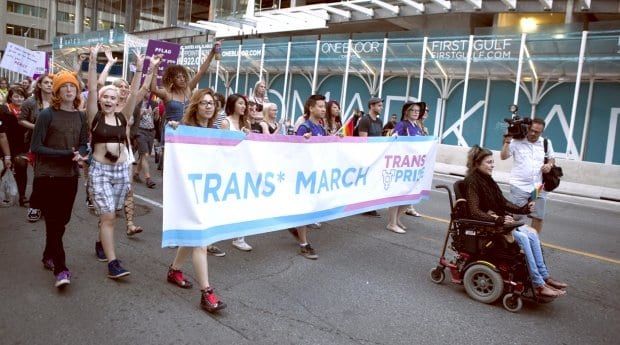Who owns Dyke March and Trans* Pride?
In Toronto, that depends on who you ask.
On July 17, 2015, word leaked on to social media that Pride Toronto had applied for trademarks over both terms, and the following day a Vancouver Dyke March organizer posted a press release condemning the move.
A story in Now magazine published two days later, written by Christin Milloy, added fuel to the fire. Until very recently, Milloy had been one of two team leads for Toronto Trans* Pride. The story included responses from former Toronto and other North American Dyke March and Trans March organizers who decried Pride Toronto’s actions. (Milloy is also a freelance writer for Daily Xtra.)
Pride Toronto, in two separate statements released 48 hours apart, maintains that it applied for the trademarks with the intention of stopping a single unnamed individual who “threatened to personally trademark both of these grassroots events and political demonstrations, to have total control over the events that have always been organized by the community.”
Since then, accusations and questions have been lobbed from all sides, many a result of inconsistencies between statements from Pride Toronto and Milloy. Milloy says that she resigned, while Pride Toronto maintains that it chose not to renew her contract.
Early reports note that the trademark applications for Dyke March and Trans* Pride were filed on July 8, 2015, two days after Milloy says she gave Pride Toronto her resignation letter.
However, on July 6, the same day that Milloy says she resigned, Pride Toronto’s executive director Mathieu Chantelois and another Pride staffer met with Milloy and several of her supporters. At that meeting Chantelois told Milloy that her volunteer contract with Pride had expired and would not be renewed. Milloy confirmed this to Daily Xtra, and provided an audio recording of that meeting.
Despite repeated requests from Daily Xtra, Chantelois declined to be interviewed for this story.
In an emailed July 9 statement sent by Victoria Schwarzl, Pride Toronto’s communications manager, Chantelois wrote that the staff and board co-chairs had “reviewed and unanimously decided to not renew [Milloy’s] contract with the organization.”
For her part, Milloy says that she had already intended to resign. In the audio recording of the July 6 meeting, Milloy can be heard giving Chantelois her resignation letter — a version of which was later published on her website on July 17. Milloy admits that she had some suspicions that her official relationship with Pride Toronto was about to end — following the festival, she says the email for the Trans* Pride group was disabled. The July 6 meeting was also called to discuss several issues and conflicts that had arisen between Pride Toronto staff and Milloy before and during the 2015 Pride festival.
* * * *
At the meeting shortly before she gave Chantelois her resignation letter, Milloy told him her beliefs regarding who owns Dyke March and Trans* Pride.
“So it brings up an interesting question of whether or not Pride Toronto actually owns the brand Trans* Pride, and for that matter Dyke March. Because as I see it, you know, these are things that belong to the community, which have been in many ways co-opted by Pride Toronto and it doesn’t really matter that some of us have been able to do a really good job at Trans* Pride if we can be immediately fired by this corporation for failing to remain in political alignment. I find that very threatening and dangerous.”
Those words are echoed in Milloy’s resignation letter, where she writes, “Pride doesn’t own Dyke March or Trans March, and I don’t believe they belong under Pride Toronto control any longer. Indeed, it is time to ask whether the Pride festival as we know it should even be allowed to continue.”
Milloy also says she removed Pride Toronto’s staff access over the Trans March Team Facebook page and changed the password and email account on the group’s Twitter after the Pride festival finished.
“I don’t believe they should be held by Pride Toronto,” she says of the social media channels. “I don’t want to keep control of the accounts. I want to surrender [them] to a new community based trans-pride organization which I do not intend to lead myself. I would like to give the accounts to an anti-oppressive trans organization, if one exists, led by a trans woman of colour, and I would join that organization — but only in a supporting role, not as a leader.”
Milloy vehemently denies that she ever threatened to trademark either phrase. “I know it’s not me,” she says.
“I have never attempted to trademark those terms; I would never try. I certainly haven’t been fundraising to do it.”
Just a few days earlier however, Milloy was less certain that she wasn’t the unnamed individual Pride Toronto was accusing.
“It’s possible that it’s me [they’re referring to],” Milloy said when she first spoke to Daily Xtra on July 21. “I have been very vocal in my statement that Pride Toronto does not own Dyke March or Trans* Pride and that community should take over.”
* * * *
Aaron Glynwilliams, one of the two co-chairs of Pride Toronto’s board, says that Milloy’s departure was a separate event from the trademark application, “One was simply an evolution of our team,” he says, adding that there was no fissure between Pride Toronto and Milloy.
“We had [Milloy] on board to see the trans programming through that festival for the past two years,” he says. “We were very happy and welcome to have the support and the contribution of that team lead over the last two years and that contract has now expired.”
Glynwilliams says the application for the trademarks was made on July 8 — two days after Pride staff met with Milloy. He would not say who specifically from Pride Toronto was involved in the decision, repeating only that it was made “as an organization.”
“I know that the staff acted very quickly on this,” he says. “That was part of what made this a difficult or a complicated issue to manage, was the speed in which we felt we needed to act.”
In a Metro news article, Chantelois identifies the individual as “she,” and specifically says that “she was rallying people around, trying to find the money.”
* * * *
Milloy says she first learned of Pride Toronto’s trademark application after she heard rumours that Pride was a trademarked term and decided to fact check it when she got to the part of her letter that dealt with ownership.
Pride Toronto organizers successfully applied to trademark “Pride” back in 2000, telling Daily Xtra at the time that it was in order to protect the event from private interests that were using the name and not putting anything back into the community. Jean-Sébastien Boudreault, the vice-president of Fierté Montreal Pride, recently told the Toronto Star that Pride Toronto has since licensed the term to his organization for $1. Over the years, many activists and community members have raised concerns about the trademark — for instance, controversy arose over the term in 2007 when the Vancouver Pride Society tried to enforce the trademark.
Milloy began contacting several Dyke March organizations including the Vancouver Dyke March, and began work on her Now magazine story. She says she filed the article over the July 18th weekend.
However, the story began to slowly leak on social media, with some community members becoming upset that there had been no consultation before Pride Toronto filed their applications.
Among the reactions was rampant speculation about who this individual was who Pride alleges forced its hand.
Monica Forrester, a community activist who incorporated the name of her group, Trans Pride Toronto in 2013 (that name has been used by the group since 2004), raised concerns that the trademark might have been a reaction to her group. Trans Pride Toronto is a non-profit group totally separate from Pride Toronto, though Forrester has worked with it in the past.
“I didn’t know if that was a reflection on me,” she says, noting that she had not been contacted and had no plans of giving up the name of the Trans Pride Toronto group.
Glynnwilliams says that there’s no connection to Forrester’s group and that he was unaware of Forrester’s group or who she is. “I feel a little bit sheepish because I’m not familiar with Monica Forrester. She sounds like she’s a great activist and important member of the community.”
In a Facebook message, Milloy says that she has also been unfairly fingered as the culprit by some community members.
“If Pride still won’t say that it’s not me, then the only thing I have to add is, I wish Pride would name their individual and share their evidence, because I am being harmed by false speculation that it’s me,” she writes.
* * * *
Despite repeated questions from the media and from community members, Pride Toronto has refused to give any details around the alleged threat to trademark Pride or about who made it.
“In our community things can get pretty vicious,” Glynwilliams says. “We’ve seen it escalate in the past, threats on people’s lives and all kinds of things.
“Wanting to respect the confidentiality and safety and security of our community members, I think it’s best for us not to share the name.”
Glynwilliams says that Pride Toronto is eager to move on and that it was never their intention to create misunderstanding or controversy in the community. “We really hope to leave this issue behind us,” he says. “It was always our intention to protect these events as events that were grassroots in nature and organized by the community, and we’ll continue in everything we do moving forward with that commitment.”
He notes, as mentioned in both Pride Toronto statements, that they would be moving to withdraw the applications and make moves as a partner to ensure both the Dyke March and Trans* Pride are protected and continue to be organized.
Forrester says it is important for Pride Toronto to do that. “They are really starting rifts within [and] between the community,” she says. “We’re losing the sense of what Pride is all about.”
Milloy also says that she understands there will be people who will take a negative view on some of what she has done. “But I still think it was the right thing to do and I’ll just face the music and take accountability for the actions I took, because I stand behind them.”
But questions still remain over what exactly triggered the actions of Pride Toronto’s staff and board members, including the biggest one: Who really wanted to trademark Dyke March and Trans* Pride?
HG Watson can be reached at hg.watson@dailyxtra.com or @hg_watson on Twitter.


 Why you can trust Xtra
Why you can trust Xtra


